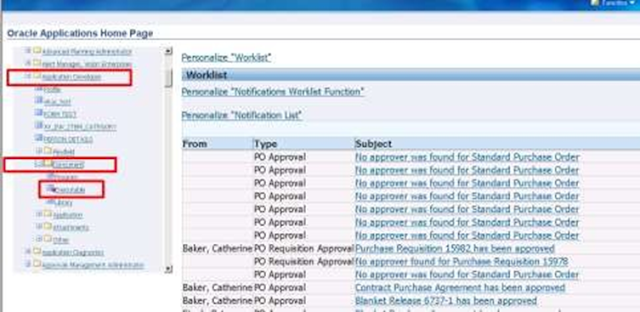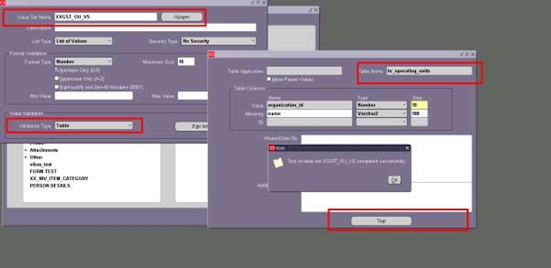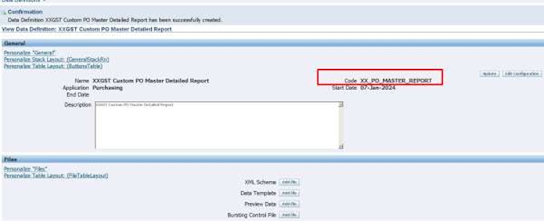PO MASTER DETAILED REPORT
Registration steps for Oracle
Reports
1.
Once we get the Requirement from Business, develop a query in TOAD/SQL Developer.
2.
Once Query has been done, place the query in Data Model SQL
Block
3. After Adding
the Parameter in User Parameters tab and successfull compilation, save the report
XXRBCSAMPLE.rdf as extension
4.
Move the .rdf to Custom
Top /reports/US Folder with Executable Permissions by Using
WINSCP Tool
5. After Login to the Application,Switch to Application Developer--> Concurrent --> Executable, give name, Short Name, application would be Custom Top Application, type is Oracle Reports , Execution file name should be given .rdf name and Save the Changes
6. Switch to Concurrent Program
Window, Enter Concurrent Program
Name, Short Name, Applications and below we have to give Executable Short Name. Output
Type is Text. If we have Any parameters ,press parameters tab
and add Parameters. saving the Changes
7. Attach our Concurrent Program in Request Group Window
8. Switch to respective responsibility and run the request
Requirement
Sample oracle report with xml report
So will take Purchase order
Report
Once requirement from business we develop query toad or sql developer and below query is PO Master Report
select pha.agent_id
,pha.type_lookup_code
,pha.segment1 po_number
,pha.terms_id
,pla.item_id
,pla.item_description
,pla.quantity,pla.unit_price
from po_headers_all pha
,po_lines_all
pla
,per_all_people_f
papf
,fnd_lookup_values
flv
where 1=1
and
pha.po_header_id =
pla.po_header_id and pha.agent_id =
papf.person_id
and
pha.type_lookup_code =
flv.lookup_code
and
flv.lookup_type =
'POXMUB_DOCUMENT_TYPE'
and
trunc(sysdate) between nvl(trunc(papf.effective_start_date),trunc(sysdate)) and
nvl(trunc(papf.effective_end_date),trunc(sysdate))
and
pha.org_id =
:p_org_id
and
pha.segment1 =
:po_number
and flv.meaning = nvl(:p_po_type,flv.meaning);
Place
the Query in SQL developer and run.
Red
color mark refers Master columns and yellow color mark refers child columns.
Once Query has been done after login to the Report builder and click on new then open like below
After that click on SQL block
shown in the below which is marked
with red color
And
then we have to place a query in Data Model SQL block
and then click on OK Button
Once click on Ok and separate the columns which are master columns and child columns
Whenever come to user parameter tab automatically created the parameters in report and if we want to add any parameters in User parameters and
their datatypes.
We have passed some runtime conditions for PO TYPE and BUYER NAME
So, add the lexical parameters in data model block as shown in the below
Once add the lexical parameters in data model block then give the conditions for that in AFTER PARAMETER TRIGGER as shown in the below
Get the item name by using item id so, I used the formulae column as shown in the below
We have to click on FORMULAE
COLUMN and give the name and set the datatype
then click on PL/SQL
Formulae write the logic as shown in the below
And
we have to use one more formula
column used for line amount
as shown in the below
We have to use two PLACE HOLDER COLUMNS
in report for item name and agent name
with help of formulae column and
click on compile and successfully compiled as shown in the below
We have to summary columns for Purchase Order Total Amount and as shown in the below
Once report is done then compile the report as shown in the below
Once successfully compiled then I we will save the report
.rdf Extension as shown in the below
Once the RDF report
file is saved
,after that we have move that file from local to the custom top report US folder with help of WINSCP
tool.
Next,
we have to login the application
After
login the application switch the application developer concurrentexecutable
We will give the name, short name, application, execution method is oracle report and execution file name should be our .rdf file name as shown in the below and we will save the changes.
Next switch the concurrent program
Open concurrent program window we will give the program
name, short name, application as shown in the
below
Give
executable short name and output type is xml
If we have any parameter add the parameters and save changes
as shown the below
After that then we wilI create
the value sets for org id ,Po number, Po type and Buyer name as shown in the below
I will use $FLEX$ for po number below seen like
And we have to add the value sets in parameters and save changes shown below.
And we have to add our concurrent program in request group window and save changes as shown in the below
Next, we have to switch the XML Administrator Responsibility HOME
And click on data definition tab then Create the data definition along with short name and concurrent
program short name and data definition code should be matched.
Next, we have to switch the templates then we have to a create
new template and add the .rtf layout in
template as shown in the below
Once template successfully uploaded then switch
respective responsibility then run the request
As shown in the below
We
have to click on submit
new request in SRS window.
We have to open our concurrent program and we have to check the template visible
or not as shown in the
below
We have to select the values for parameters and then run the program.
Finally the Output




































No comments:
Post a Comment